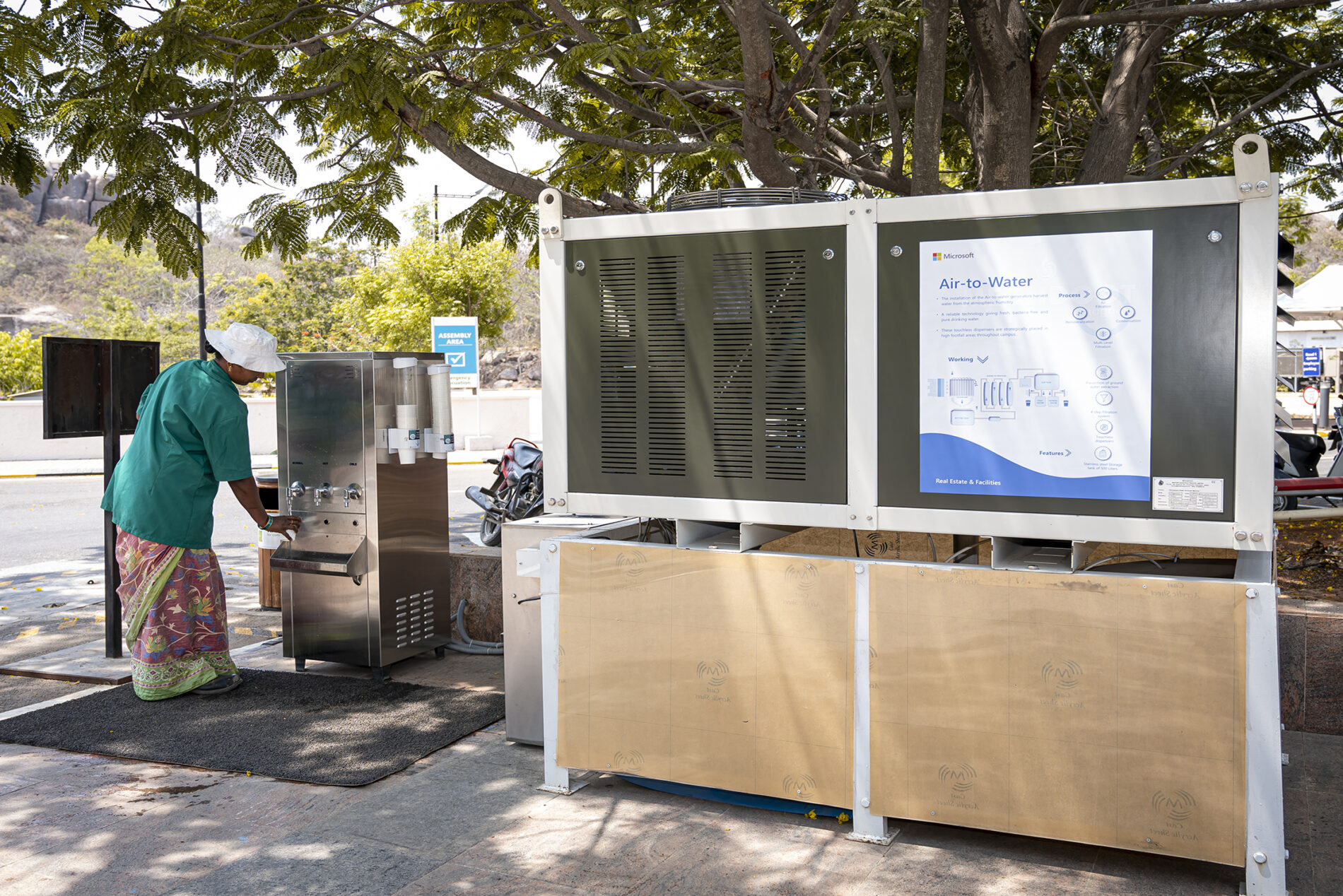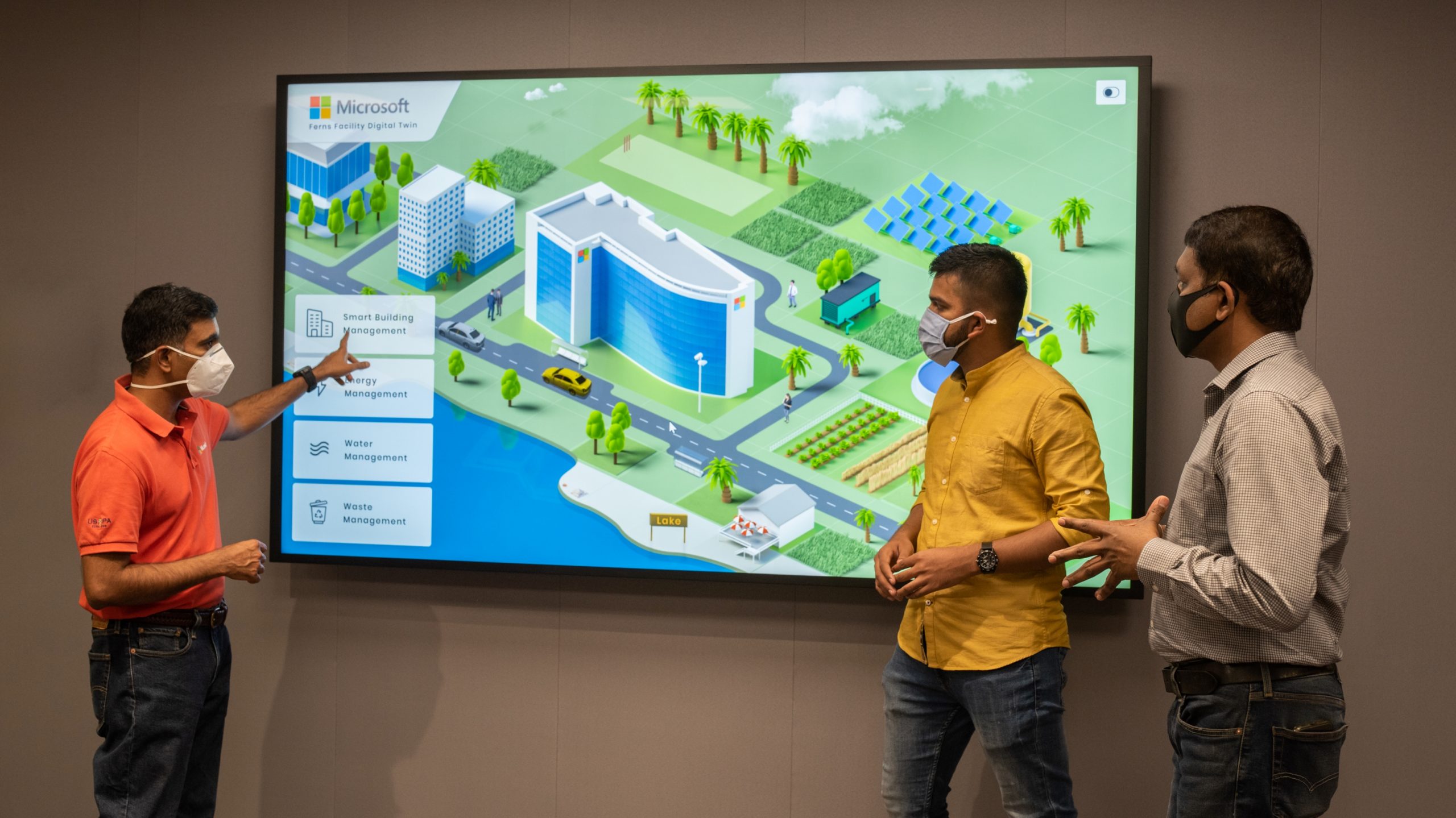
From ‘magic water’ to digital twins, Microsoft is making its campuses in India more sustainable
After more than two years of working from home through the pandemic, thousands of employees are returning to Microsoft’s Hyderabad campus. And most seem to have one question on their minds: When can they taste its new “magic water?”
Four new air-to-water generators were installed while they were away from their offices. The system is now producing nearly 2,000 liters (528 gallons) of purified drinking water a day by capturing humidity from the air. That’s the equivalent of offsetting four million liters of ground water extraction.
The generators have been installed around the campus at places where piped drinking water is not available, and away from the main campus buildings. This eliminates the need for typical water dispensers that require water cans to be brought in multiple times a day and generate waste in the form of discarded plastic caps.
The air-to-water generators are one of the many sustainability projects implemented at Microsoft campuses across India, that support the company’s climate commitments.
“Each day at Microsoft, we strive to build, deliver and operate workspaces that are connected, accessible, sustainable and secure, creating unparalleled employee experiences while shaping a healthier future for local communities and the world. We believe that technology can help individuals and organizations reach a more sustainable future,” says Ambar Mitra, regional head, Global Workplace Services (GWS). “And that’s reflected in the initiatives we’ve implemented across our campuses all over India.”
Leading the charter to make Microsoft’s campuses in India and Asia more sustainable is Arvindh Prakash Ayyaswamy, senior portfolio manager, GWS, Microsoft India.
“I’m the only engineer on the team and I like to go behind the scenes to find out the electrical and mechanical aspects of various solutions,” he says. “I also attend many symposiums and depend on knowledge sharing to explore the best practices available to the industry.”
During the pandemic, the real estate team decided to upgrade Microsoft’s campuses in Hyderabad and Bengaluru to align with the company’s goals to become carbon negative, water positive, and zero waste by 2030.
Some of the projects were aligned with industry standards, like installing solar panels on top of a multi-level car park in Hyderabad that can generate 0.5 megawatts of electricity or reducing energy consumption by AC units.
“We installed an adiabatic cooling system in the air-cooled chillers and replaced the conventional blowers in our air handling units with electronically commutated fans at our Bengaluru campuses as an energy conservation measure. These changes can potentially help reduce electricity consumption by 22%,” he says.
But the team also looked at some innovative solutions that aren’t common in most workplaces in India to tackle problems that are unique to the country.
For instance, the basements of most offices have battery-based UPS (Uninterrupted Power Supply) for backup during an electricity outage. These use an array of lead-acid or lithium-ion batteries that bridge the gap between the time there’s a power outage and the generators kick-in.
“The batteries need to be kept in an air-conditioned room. They must be replaced every three to five years and they eventually end up in landfills,” Ayyaswamy explains. “We were looking for a solution that could help us get rid of these batteries.”
The answer came in the form of a flywheel UPS that does not require any cooling and can be placed anywhere, even exposed to external elements. They are eco-friendly and can be recycled at the end of their lives. The team has already installed these in two campuses in Hyderabad and Bengaluru with plans to upgrade other campuses too.

While all these solutions required looking out, some existed in plain sight by the virtue of being at Microsoft. A serendipitous meeting with a colleague in the pre-pandemic days triggered one of the most ambitious projects that has the potential to change the way the real estate team monitors and operates real-estate facilities.
“We were catching up casually over lunch one day when Arvindh mentioned about how difficult it was to manage a campus and wished there was a way to get real-time insights into what was happening in the buildings,” recalls Sandeep Jayaprasad Alur, who runs the Microsoft Technology Center (MTC) in Bengaluru where they create digital experiences for customers.
It was too good a problem statement for Alur to pass on.
So, he suggested creating a digital twin of the Bengaluru campus using Azure Digital Twins.
“There was a wealth of data in several forms and shapes, but they existed in different forms and with different vendors,” says Alur.
“We wanted to present this data so that it could tell a story.”
Existing equipment at the Galaxy Ferns campus in Bengaluru was retrofitted with IoT sensors that now feed near real-time data about water, electricity and fuel consumption into a single dashboard that is monitored by the GWS team.
Now they can see the number of people in the building and adjust the air conditioning accordingly to save electricity. The dashboards also find outliers enabling the team to fix them immediately rather than wait for the next monthly meeting.

“The digital twin of our Bengaluru campus has helped us identify gaps that are impossible to notice manually,” says Ayyaswamy. “We can now monitor the health of our key infrastructure, from a single source, which helps us manage the campus better. For example, if we notice the productivity of the biodigester reducing daily, we will be able to do something about it proactively before it breaks down.”
